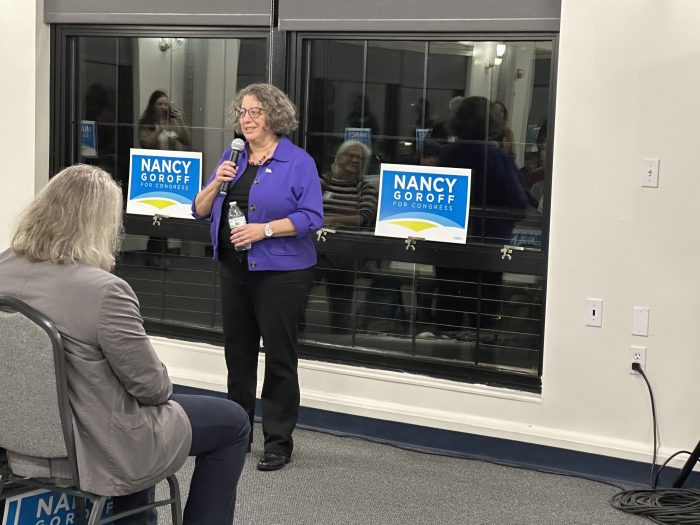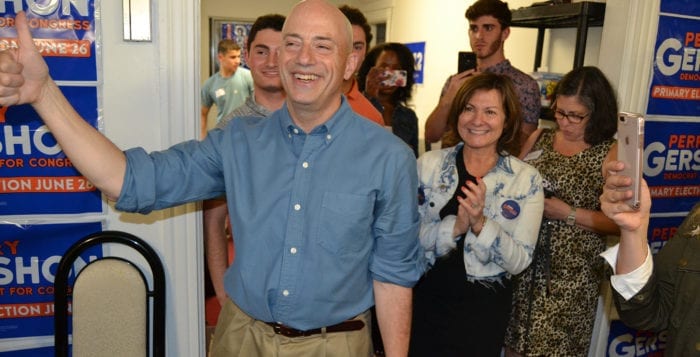By Lynn Hallarman
Talk to anyone about why they attended Nancy Goroff’s kickoff fundraiser event for the U.S. House of Representatives Democratic primary election for New York District 1, and they will mostly say the same thing: “She is smart, and she’s sane.”
Goroff, a Stony Brook resident, worked on perfecting her stump speech in front of a friendly crowd of supporters last Thursday night, Jan. 18, at the Port Jefferson Village Center. She seemed unconcerned about her primary competition, aiming most of her comments at incumbent Nick LaLota (R–NY1).
“LaLota likes to talk about stuff but hasn’t done anything for the district,” Goroff said, in an interview with TBR News Media.
A newcomer to politics in 2020, Goroff lost the House race by 55%-45% to four-time incumbent Lee Zeldin (R). But now Goroff sees this election cycle as winnable against first-termer, LaLota, who won the seat against former Suffolk County Legislator Bridget Fleming (D-Noyac) in 2022.
Goroff’s concerns now are the new redistricting maps currently being drawn by the state’s bipartisan Independent Redistricting Commission to be filed by Feb. 28.
“We’ll deal with whatever we get, but we feel pretty good about where the district is right now,” she said.
Goroff, 55, has spent her adult life in Suffolk County, raising her two children and building a career as a scientist at Stony Brook University. Her pedigree is pure university professor. Starting with a bachelor’s degree from Harvard University in 1990 and a doctorate in chemistry from UCLA, Goroff then devoted her career to basic science research as faculty in the Department of Chemistry at SBU and then the department chair. She retired from her position in 2021 to focus on her political career.
Goroff looked nonplussed at the assertion from some of her primary opponents that her academic credentials do not add up to enough experience working in government.
Anyone that thinks that “hasn’t worked at a university,” she said.
She sees her years navigating a career as a woman scientist and educator in a large state university as an asset. “I’m also the daughter of small business owners,” she said. “These things give me knowledge and experience that will be helpful as a policymaker.” If she wins in the general election in November, she will be the first woman basic research scientist in the House of Representatives.
Several of her former Stony Brook colleagues showed up for the event, commenting to TBR that Goroff’s leadership superpower is her ability to coalition build and work as a team member. They believe this makes her candidacy especially strong in the politically purple landscape of eastern Long Island.
After losing the house race to Zeldin, Goroff did not retreat into an academic ivory tower, instead, she leveraged her skills to co-found the nonprofit Long Island Strong Schools Alliance.
“Most candidates disappear after they lose— not Nancy,” said longtime supporter Shirley Hudson.
Goroff explained that LISSA focuses on making sure Long Island public schools are places where children are welcomed regardless of their background.
“We saw right-wing extremists win three school board seats in Smithtown in 2021, who had no interest in supporting public education,” she said. “They were trying to undermine it and make it fit their extremist ideology.”
Goroff places the protection and well-being of children at the center of most of her policy positions, arguing that Long Island needs to be a safe and affordable place to work and raise a family.
“People are struggling,” she said. “Housing is a chronic issue on Long Island because of the cost.”
Besides Goroff, other declared Democratic primary candidates to date are construction worker Andy DeCecco, former state Sen. James Gaughran (D-Northport), administrative law judge Craig Herskowitz and former Capitol Hill senior legislative aide Kyle Hill.
The Democratic primary election is scheduled for June 25.










